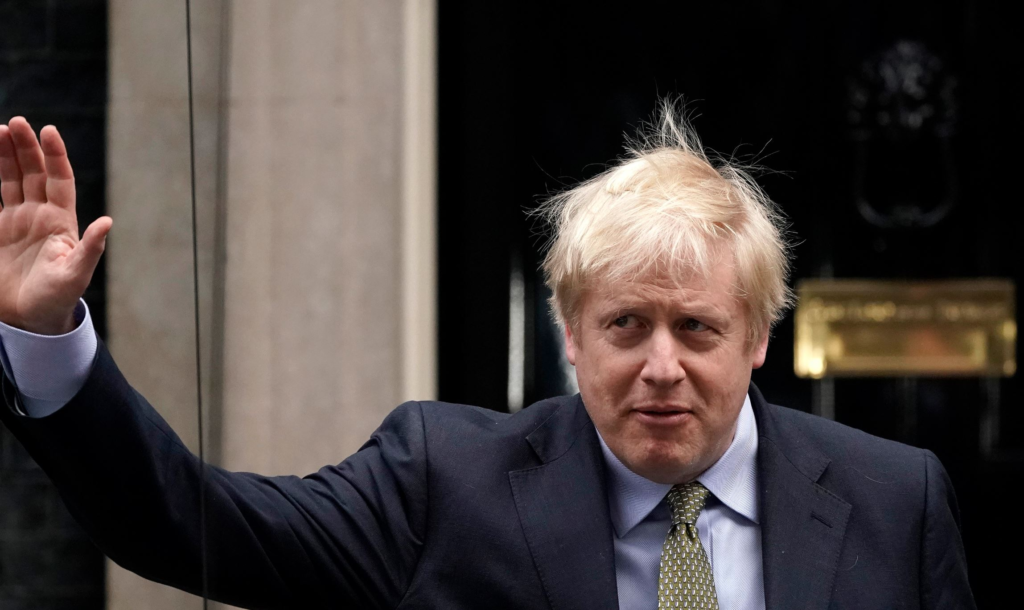
UK Prime Minister Boris Johnson faces two high-stakes encounters in parliament on Wednesday after his government was rocked by the shock departures of two senior ministers.
Rishi Sunak resigned as finance minister and Sajid Javid as health secretary on Tuesday night. Both said they could no longer tolerate the culture of scandal that has stalked Johnson for months. They will now sit on the Conservative back benches at the weekly session of Prime Minister’s Questions in the House of Commons at 1100 GMT, which promises to be even more combustible than usual.
Johnson then faces an hours-long grilling from the chairs of the Commons’ most powerful committees, who include some of his most virulent critics in the Tory ranks.
The exits of Sunak and Javid were announced minutes after the prime minister apologized for appointing a senior Conservative, who quit last week after he was accused of drunkenly groping two men.
Former education secretary Nadhim Zahawi has been elevated to the finance brief.
“You don’t go into this job to have an easy life,” Zahawi told Sky News on Wednesday.
“Sometimes it’s easy to walk away but actually, it’s much tougher to deliver for the country,” he added.
Days of shifting explanations had followed the resignation of deputy chief whip Chris Pincher. Downing Street at first denied Johnson knew of prior allegations against Pincher when appointing him in February. But by Tuesday, that defense had collapsed after a former top civil servant said Johnson, as foreign minister, was told in 2019 about another incident involving his ally.
The Pincher affair was the “icing on the cake” for Sunak and Javid, Tory MP Andrew Bridgen, a Johnson critic, told Sky News.
“I and a lot of the party now are determined that he will be gone by the summer recess (starting on July 22): the sooner the better.”
The resignations dominated British newspaper front pages. The Times ran with headline “Johnson on the brink,” while the conservative Daily Mail tabloid was more colourful: “Can even Boris the Greased Piglet wriggle out of this?”
Former loyalist and Brexit pointman David Frost, influential among Tory grassroot members, also wrote in the Daily Telegraph on Wednesday “it is time to go”.
“The repetition of the same mistakes, and the refusal to acknowledge the need for change, means that this Prime Minister is never going to get better.”
The resignations came after Johnson only narrowly survived a no-confidence vote among Conservative MPs a month ago. Other cabinet members, including Foreign Secretary Liz Truss and Defense Secretary Ben Wallace — two likely contenders for the leadership — continue to back Johnson, aides said.
Humility?
Jacob Rees, Mogg, a doggedly loyal cabinet ally, dismissed the resignations as “little local difficulties”.
“Losing chancellors is something that happens,” he said on Sky News, pointing to past Tory leaders, although Margaret Thatcher was ultimately felled by a cabinet revolt by top allies.
Sunak’s departure in particular, in the middle of policy differences over a cost-of-living crisis sweeping Britain, is dismal news for Johnson. The chancellor of the exchequer said “the public rightly expect government to be conducted properly, competently and seriously”.
“I believe these standards are worth fighting for and that is why I am resigning,” Sunak wrote to Johnson.
Javid preceded Sunak at the Treasury before quitting over a prior bust-up with Johnson.
He wrote that the prime minister’s survival in last month’s no-confidence vote gave him the opportunity to show “humility, grip and new direction”.
“I regret to say, however, that it is clear to me that this situation will not change under your leadership — and you have therefore lost my confidence too.”
‘Collapsing’
Johnson has been embroiled in various scandals, above all the so-called “Partygate” affair, which saw him receive a police fine for breaking his own coronavirus lockdown restrictions in Downing Street.
The 58-year-old premier still faces a parliamentary probe into whether he lied to MPs over the lockdown-breaching parties in Downing Street.
Pincher’s departure from the whips’ office — charged with enforcing party discipline and standards — marked yet another allegation of sexual misconduct by Tories in recent months. Conservative MP Neil Parish resigned in April after he was caught watching pornography on his mobile phone in the House of Commons.
That prompted a by-election in his previously safe seat, which the party went on to lose in a historic victory for the opposition Liberal Democrats. Labour, the main opposition party, defeated the Conservatives in another by-election in northern England on the same day, prompted by the conviction of its Tory MP for sexual assault.






